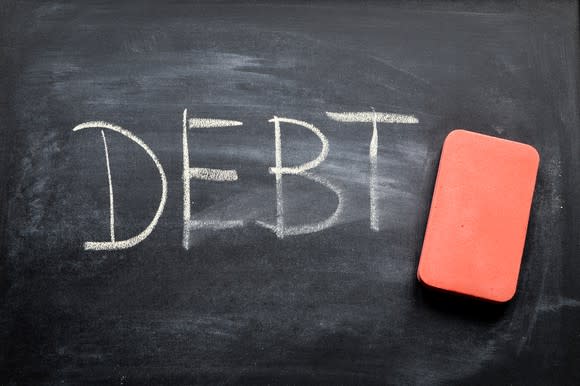This Is the Most Important Thing When It Comes to Paying Off Debt
Americans seemingly have no fear of debt. We borrow to buy cars, houses, to pay for school, and, in many cases, for reasons that are a lot less justified. In fact, the average American household has $137,063 in debt, according to the Federal Reserve's latest numbers.
Of course, a lot of that debt is mortgage -- a type of debt most are forced to take on if they want to own a home. Still, the average American household has $15,654 in credit card debt, $27,669 in auto loans, and $46,697 in student loans, according to a recent NerdWallet study.
It's the credit card debt that's the biggest problem for most people. It's generally the most-expensive debt anyone carries, and you can minimize what you pay by paying off what you owe faster.
The good news is that many people know they have a problem. More than half of the 1,000 people who tried to pay off debt in 2017 surveyed by CompareCards succeeded.

Debt can be erased if you have a plan. Image source: Getty Images.
What did the survey say?
The most important thing when it comes to paying off debt is making a conscious decision to do so. Well-over-half (64%) of those who made cutting their debt a goal in 2017 were able to do so by an average of $7,500. Nearly half of those surveyed (47%) made paying off debt a New Year's resolution and 60% of those surveyed admitted this was not the first time they tried to pay down what they owe.
How did people do it?
Not surprisingly, cutting spending was the most popular method those surveyed cited as to how they paid off debt at 61%. Getting additional work through the gig economy came in second at 20%.
"Seventy-five percent of people who succeeded paying off their debt developed a specific plan to pay off debt last year, according to the survey," wrote CompareCard's Kira Brecht. "By comparison, just a little over half (51%) of those who tried to pay down debt but failed said they had a plan."
It's also worth noting that those working to pay down debt practiced another smart personal finance policy. The majority of them (64%) also had an emergency fund. Generally, it's recommended that your emergency fund equals six months of living expenses. That may sound excessive, but it's an important defense against adding credit card debt should there be a disruption (think job loss, illness, or unexpected household repair) in your finances.
You have to get started
When it comes to paying off debt, intent is clearly a key part of success. It's important to make a specific declaration that you plan to cut your debt, then create a plan to put it in motion.
In many ways, it's not that different from deciding to lose weight. It's easier to do when you hold yourself accountable and have a very specific plan to make it happen.
More From The Motley Fool
The Motley Fool has a disclosure policy.
